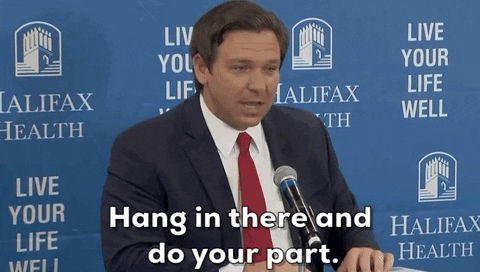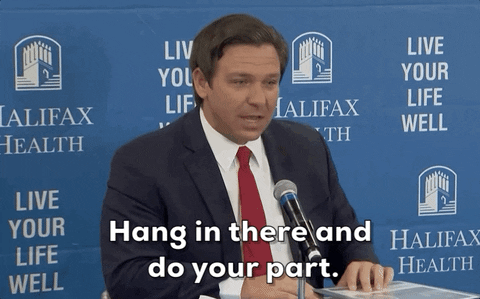
Ever since Florida voters decided to give the right to vote back to most people convicted of felonies, the GOP has been trying to figure out ways to stop it. So last year, the Republican-controlled Florida legislature and feces-in-the-shape-of-a-frat-bro Ron DeSantis developed a fun, new pay-to-vote system for the formerly incarcerated. (It's almost impressive that Florida found a way to create a new poll tax here in the 21st Century, but Florida gonna Florida and ratfuckers gonna ratfuck, so here we are.)
But on Sunday, Northern District of Florida Judge Robert Hinkle told Florida to take its poll tax and shove it — though in much kinder words.
Following a unique trial-by-video-conference held last month, Judge Hinkle ruled that Florida's pay-to-vote scheme was unconstitutional.
The State of Florida has adopted a system under which nearly a million otherwise-eligible citizens will be allowed to vote only if they pay an amount of money. Most of the citizens lack the financial resources to make the required payment. Many do not know, and some will not be able to find out, how much they must pay. For most, the required payment will consist only of charges the State imposed to fund government operations—taxes in substance though not in name.
While this likely isn't the end of this particular story, it is nonetheless a huge win for justice — and the 1.6 million people with felony convictions who Florida is trying to stop from voting.
Here's the backstory
Florida disenfranchises more people than any other state. As of 2016, more than 10 percent of potential voters in Florida were disenfranchised due to past felony convictions.
So in 2018, Florida voters passed Amendment 4, which restored the right to vote to most people convicted of felonies who had served their sentences. Yay, a nice thing! And in Florida, no less!
Amendment 4 tried to give back the right to vote to a huge number of people. But because there's nothing Republicans like more than disenfranchising people of color, they just couldn't let that stand. And so, last year, the Florida legislature passed SB7066, a bill designed to disenfranchise the newly reenfranchised. In particular, it redefined "completion of all terms of sentence including probation or parole" from Amendment 4 to include financial obligations included in a person's sentence — obligations which many former offenders, particularly those who have recently been released, are simply unable to pay.
The fees and costs imposed on a criminal defendant can easily run into four figures — an insurmountable sum for most people who have just been released from prison. Jobs given to prisoners pay pennies on the dollar, and for many with felony convictions, the job prospects once they get out aren't much better. There's also the small fact that Florida hasn't even established a system for former offenders to check on the sum and status of their fines. So that's cute.
Poll taxes are a tried and true way to stop people of color, poor people, and other members of vulnerable communities from voting. After the Fifteenth Amendment gave men of color the right to vote, states turned to poll taxes to stop them. The 24th Amendment, ratified in 1964, put a stop to poll taxes for good — or so it seemed. But Republicans never like to let little things like the Constitution get in the way of their plots, so here we are.
The state, of course, argued that this wasn't a poll tax. But a rose by any other name would smell as sweet — and rhinoceros dung by any other name would still smell fucking disgusting. Or, as Judge Hinkle put it,
the fees are assessed regardless of whether a defendant is adjudged guilty, bear no relation to culpability, and are assessed for the sole or at least primary purpose of raising revenue to pay for government operations—for things the state must provide, such as a criminal-justice system, or things the state chooses to provide, such as a victim-compensation fund. A tax by any other name.
Hinkle, a Clinton appointee who also struck down Florida's ban on same-sex marriage as unconstitutional, was unamused by the state's bullshit.
This pay-to-vote system would be universally decried as unconstitutional but for one thing: each citizen at issue was convicted, at some point in the past, of a felony offense. A state may disenfranchise felons and impose conditions on their reenfranchisement. But the conditions must pass constitutional scrutiny. Whatever might be said of a rationally constructed system, this one falls short in substantial respects.
In addition to violating the National Voter Registration Act, the court also found that Florida's poll tax was unconstitutional in three ways:
(a) The system is unconstitutional as applied to individuals who are otherwise eligible to vote but are genuinely unable to pay the required amount.
(b) The requirement to pay, as a condition of voting, amounts that are unknown and cannot be determined with diligence is unconstitutional.
(c) The requirement to pay fees and costs as a condition of voting is unconstitutional because they are, in substance, taxes.
Under the court's order, people who are unable to pay the taxes that come along with their criminal convictions must be allowed to vote. It also sets forth procedures for the state to follow going forward, as the current chaos was so absurd as to be unconstitutional.
Yay! A nice thing! In 2020!
But wait ...
Florida gonna Florida, so the state will probably appeal. Florida is part of the US Court of Appeals for the 11th Circuit, and while that court is generally conservative, it has already weighed in on this case — and it was unamused by the Sunshine State's fuckery.
Last fall, the 11th Circuit upheld a preliminary injunction in this case and most of Judge Hinkle's ruling is based on that earlier order. And since that ruling, as Judge Hinkle wrote, the challengers' "evidence has grown stronger."
Unfortunately, the 11th Circuit isn't the only hurdle the plaintiffs will have to clear. The Roberts Court takes its role as the judicial branch of the Republican Party very seriously and has already stepped in in a myriad of ways to try to shore up a Trump victory come the fall by issuing stays, in cases ranging from Trump's tax returns to the release of Trump-Russia documents.
So no matter what happens at the 11th Circuit, it's entirely possible that SCOTUS will step in to do its new favorite thing and issue a temporary stay of the lower court orders. This would allow the status quo of ratfucking to remain in place until the Supreme Court has had time to consider the issue in full — after the 2020 election.
So yeah, there's still a lot to worry about. But with so little to celebrate these days, it's also important that we take a step back and toast to this win.
Cheers!
Meryl Streep Cheers GIF by Cosmopolitan Giphy
Want to read the full 125-page opinion? Here you go! It's a good one!
Do your Amazon shopping through this link, because reasons .
Wonkette is funded ENTIRELY by YOU! Click the widget, please and thank you, if you are able!












If a panel (i.e. not all) of appellate judges in a given Circuit (appellate court) issues a verdict, who picks the panel members? How does a panel’s authority get bumped into en banc (full court) review? I presume the en banc verdict governs. Thanks for any clarification. I haz been having this confuze for a while.
Pyle of what?